ESSA stipulates that state academic standards and technical standards are aligned with postsecondary entrance requirements. The following resources highlight some strategies such as competency-based education that states can consider to ensure students are ready for postsecondary success.
Early college high schools are partnerships between secondary and postsecondary institutions and businesses that allow students to earn both a high-school diploma and an associate’s degree or postsecondary credit towards a bachelor’s degree. This evidence-based practice provides a learning environment that enhances students’ education experience and improves student outcomes in high school and postsecondary education.
One strategy states are using to promote postsecondary readiness is competency-based education (CBE). CBE is a flexible, student-centered approach that allows all students to demonstrate mastery at their own pace. This guide – a collection of slides, handouts, and a facilitator’s guide, outlines how to identify and convene a team of stakeholders who will set the vision and assess the readiness of the state to develop a competency-based articulation agreement.
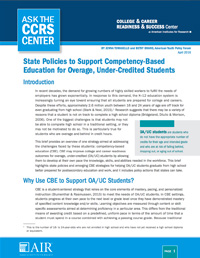 State Policies to Support Competency-Based Education for Overage, Under-Credited Students | April 2016
State Policies to Support Competency-Based Education for Overage, Under-Credited Students | April 2016
Competency-based education (CBE) is one emerging strategy for addressing the needs of at-risk youth because it is personalized to individual students, offers self-paced instruction, and ensures mastery of specific content and skills. This brief discusses how CBE can support OA/UC students and provide recommendations for how other states can develop and implement CBE policies.
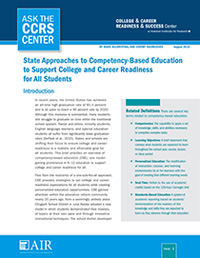 State Approaches to Competency-Based Education to Support College and Career Readiness for All Students | August 2015
State Approaches to Competency-Based Education to Support College and Career Readiness for All Students | August 2015
This brief introduces the core elements of CBE and discuss how states can support the development of CBE through policies, guidance, and expanding assessment mastery.
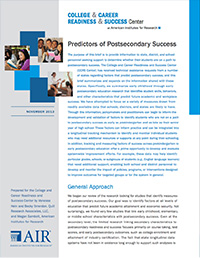 Predictors of Postsecondary Success | November 2013
Predictors of Postsecondary Success | November 2013
This brief summarizes early childhood through early postsecondary education research that identifies student skills, behaviors, and other characteristics that predict future academic and workplace success. This information can support policymakers and practitioners as they begin to develop and validate factors that identify students who are on a path to postsecondary success as early as prekindergarten and throughout their academic career.
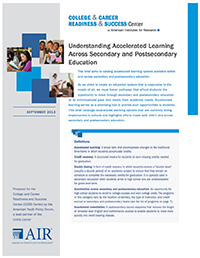 Understanding Accelerated Learning Across Secondary and Postsecondary Education | September 2013
Understanding Accelerated Learning Across Secondary and Postsecondary Education | September 2013
Accelerated learning is one strategy to ensure mastery of academic standards is meaningful for all students. This brief catalogs accelerated learning options that are currently being implemented and highlights efforts made both within and across secondary and postsecondary education.
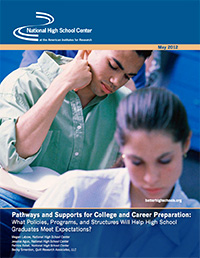 Pathways and Supports for College and Career Preparation: What Policies, Programs, and Structures Will Help High School Graduates Meet Expectations? | May 2012
Pathways and Supports for College and Career Preparation: What Policies, Programs, and Structures Will Help High School Graduates Meet Expectations? | May 2012
This brief summarizes the pathways and supports of college and career preparation organized into three key threads: 1) Personalized Learning Supports; 2) Rigorous Programs of Study; 3) Aligned Resources, Structures, and Supports. The brief includes key factors that schools, districts, and states may want to consider as they begin to build, analyze, and address pathways and supports specific to college and career readiness in their contexts.
